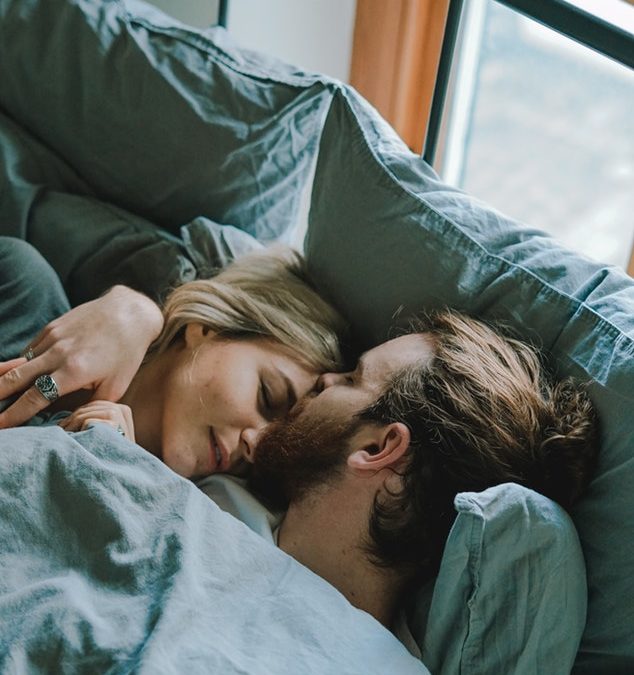Sleep is a great barometer as to how everything else is going for you. I have yet to hear someone come in with mental health problems and not talk about how shitty their sleep is. Worse yet is that mostly people end up getting a prescription sleep aid, use and over the counter sleep aid or use marijuana or alcohol to help them sleep. None of those actually work. You might ‘sleep’ but you will not get the restorative sleep your body actually needs. So, now what? Well, let’s take a look at some sleep habits first before we add a supplement, or prescription, ok?
Sleep habits are also called, sleep hygiene. It’s a weird term, but one that is used to describe the habits we have around sleep. As you are reading this, I’m sure you probably already know some of the ‘bad’ habits you have developed over time. Or, if you are like me you have had to endure some bad habits of your partner around sleep (mine is the constant TV turned on).
Let’s first talk about some culprits of bad sleep. The first culprit is a neurotransmitter imbalance. Your neurotransmitter levels can dictate some of your sleep patterns. Keeping it simple…serotonin creates melatonin. Melatonin help you sleep. So, if your serotonin is imbalanced your melatonin will likely be imbalanced as well. One indicator of serotonin imbalance is having trouble falling asleep. Also, if your dopamine, adrenaline or GABA are imbalanced your sleep will be hijacked too as you probably won’t be able to shut your brain off at night to go to sleep. I’m not a big believer in supplementing with melatonin. Since serotonin creates melatonin I would rather start with correcting neurotransmitter imbalance and allowing your brain and body to do the work naturally. If you have trouble staying asleep you might consider a couple of things. First consider magnesium supplementation. Magnesium is a natural relaxer and might help you stay asleep. Secondly if you are suddenly awake and it is 2 AM, it might be a blood sugar imbalance. Try a protein snack before bed or a light protein snack if you wake up. Also you could try some l-glutamine to stabilize blood sugars.
Let’s say that you have tried the above mentioned ideas and your sleep is still lacking and you don’t feel rested. Now it’s time to look at your environment. I put this last as typically there is a reluctance to change routines here. But…if nothing else is helping, this might be what you are needing to do.
CHECK OUT MY YOUTUBE VIDEO ON HOW TO GET THE BEST SLEEP OF YOUR LIFE, RIGHT HERE
Things To Avoid
Caffeine
You probably know that caffeine is a stimulant. But, you might be caught in the cycle of “I’m so tired in the afternoon that have to drink it to stay awake”. I have also heard people say that they are so tired and caffeine doesn’t make a difference to their sleep. Well, it does! Not only does caffeine reduce the quality of deep sleep that you get, but it can impact you for more than 24 hours, sometimes for a couple of days. In one study it was found that drinking caffeine 6 hours before bed reduced deep sleep time by 1 hour. Right now you might be saying, so what? But…you are also reading the chapter on sleep, right?? Caffeine has a half life of 3-5 hours. It reaches peak levels in your blood in about 60 minutes. So..let’s do the math on that. Lets say you drink 200mg of caffeine at 2pm. You will still have 100mg of caffeine in your system at 8pm and 50mg in your system at 2am and 25mg of caffeine at 8am and so on. So essentially 200mg of caffeine will need almost an entire day to metabolize through your system. But, keep in mind that by 8am you are probably reaching for more. Additionally caffeine impacts your adrenals. If you reach for caffeine upon waking your adrenals (which produce cortisol) become sluggish over time. So, if nothing else, wait on the caffeine (about 2 hours) after you wake up to allow those adrenals to get going first. Or, if sleep is a huge problem for you, eliminate it altogether for a while and see what happens. Caffeine can be found in some sneaky places so make sure that you are reading labels closely.
Alcohol
Many people grab alcohol at the end of a busy day to help them relax and to potentially fall asleep. There was a recent review of literature that totally debunked the idea that alcohol helps you sleep. Yes, alcohol helped people to fall asleep but it impaired the REM and deep sleep cycle. The more you drink, the more pronounced these effects were. Another effect of alcohol is reactive hypoglycemia. Remember the section on blood sugar? Review it quickly. But, essentially alcohol will cause your blood sugar to fall and wake you up when adrenaline starts pumping. So, you might pop out of bed at 2am or just anytime that you consider too early.
The Role of Blood Sugar
Making sure that your blood sugar is stabilized before bed is a great way to have a good night’s sleep. If you eat sugar or drink alcohol before bed you will experience a spike and dive in blood sugar. Then your adrenaline will kick in and wake you up. How do you combat hypoglycemia? Make sure your blood sugars are stabilized. Instead of reaching for a salty, carby or sugary snack before bed, reach for some protein. If you wake up in the middle of night try a small protein snack bedside or take some l-glutamine.
Ways To Improve Sleep
Your Room Itself:
Is your room a place of solitude? Or, is your room a catch all for everything? Is it a relaxing place or is it relatively chaotic or even stressful? Start here. Do your clothes have a ‘home’? Are your shoes everywhere? Begin to straighten our your environment. Put clothes where they belong, tuck your shoes away and really turn your bedroom into a haven for sleep. There should only be two activities that you do in your bedroom…get sleep and have sex. If you are doing more than those two things, then you need to do some evaluation here.
Your bed/bedding/pillows
It’s funny because I talk to people all the time about sleep but rarely do we bring up the bed you actually sleep on. Many people actually choose to sleep on a couch or recliner because their beds are so uncomfortable! But, they don’t consider getting a new mattress. Can’t afford a new mattress? Get a memory foam mattress topper (not just one of those egg crate toppers either). Once I got a memory foam mattress, my nights changed forever. I used to wake up stiff with a terrible back ache. No more!
Your bedding is another area of consideration. You don’t need 15 sheet sets. All you really need is to splurge on one super comfy set of sheets that you can wash and reuse. I will tell you that I would rather splurge on an awesome set of sheets than rotate a few crappy, scratchy sets wouldn’t you? In addition to that think about blankets. I love super soft blankets. I also have about 6 blankets on my bed. It’s kind of like layers of winter clothes. I can pull up covers or take them off depending upon how hot or cold I am. Finally, don’t forget about pillows! If you can’t change anything else, change your pillow. There is a difference between a $5 pillow and a $75 pillow. I swore I would never spend that much on a pillow, until I did. Oh Man! That was a game changer! My pillow actually keeps it shape and I keep my comfort all night.
Lights
Shut all of your lights off and take a look around the room. What lights do you see? Maybe the phone charger lights up or the cable box light is lit. What do you see? Blue light suppresses the production of the sleep hormone melatonin more than any other light source. Green lights aren’t much better and suppress melatonin about half as much as blue lights. So, it is very important to eliminate as much light as possible in your bedroom.
- Some light sources:
- Blue Lights
- Green Lights
- lPhone lights
- Night lights
- Television
- Screens (tablets, reading devices)
- Light coming in from a shadeless window
Telephone ,Tech or TV Use Before Bed
All screens and this in telephones, tablets (tech) and TV interrupts your natural circadian rhythm (sleep wake cycle). They also interfere with serotonin productions. Additionally using technology or TV while in bed causes you to go to bed later and keeps your brain from shutting down (due to stimulation). Cut tech time and TV out 1-2 hours prior to bedtime to improve your sleep quality.
Sounds
Noise can be disrupting to your sleep particularly during certain sleep phases. The phase impacted the most is the falling asleep and beginning sleep phase. Noise can also impact sleep during sleep phase transition such as REM sleep to deep sleep. Noise can prevent you from falling asleep and can wake up after you are asleep. Take a minute to lay in bed with everything off. What do you hear? Perhaps you have a clock ticking or you can hear the dog licking himself. These things might be subtle but worth fixing. Also if the TV or radio is on through the night, you might be disrupting your sleep unknowingly. A final disruption is a partner snoring. Snoring causes a lot of problems for not only the person doing it, but also for the person sharing a room. There are some essential oil blends that can help. So can different pillows, bedding, mattress or even weight loss. But snoring isn’t always a weight loss issue. Sometimes it’s a medical condition or a sleep hygiene problem. Using a sound conditioner can help with down out noises with white noise. A fan can also do this. But, if you don’t need to drown out noises (such as snoring), turn off noise producing items.
Temperature
You are more likely to sleep easier in a cooler environment. Finding the cooler environment is a personal decision. I like to sleep with the house temperature at 62-64 degrees. I layer up my blankets so I can adjust hotter or cooler much easier. My hubby likes a hot sleep environment (but then complains when he wakes up in a sweat) so we do have a heated mattress pad that we can regulate different temperature on each side of the bed.
Routine
Since my kids were little we instilled a good bedtime routine so their little bodies knew when it was time to begin to wind down and fall asleep. The routine was essentially bath, book and bed. If you think about some of the bedtime routines that you have around sleep you can easily pair new routines with the old ones. For instance if you brush your teeth before bed, take a magnesium supplement at the same time or plug your phone in and don’t look at it for the night. If you put your phones and technology away (and shut off the TV) this is a great time to reconnect with your partner and with your family too. Finally, don’t exercise too close to bedtime. You won’t be able to turn your adrenaline down far enough to get you to sleep.
Keep a consistent bedtime and wake up time even on the weekends. I know the bedtime during the week isn’t as challenging as on the weekends. But I always think back to my kids when they were little. Their body didn’t care if it was Friday night or Wednesday night they were used to the same sleep wake cycle. Your adult body is not different especially during this correction period. So give a consistent sleep wake pattern a try.
Sleep Aids and Supplements
I really never advise to take an over the counter sleep aid or a prescription aid. They are often addictive and you might have trouble sleeping without them. Some natural remedies to try are:
- Essential oils diffused bedside (review the chapter on essential oils)
- Epsom salt baths or foot soaks
- Magnesium supplementation
- A supplement that is designed for natural sleep such as insomnitol
- Consider GABA if you have trouble turning off your brain
- Consider l-Theanine or Taurine as well
Still Having Trouble Sleeping?
It might be time to get that neurotransmitter lab done! Let’s figure this out so you can get the best sleep of your life!
I would love to chat! Call me directly at 920-257-6923 or send me an email at DrTeralyn@DrTeralyn.com



